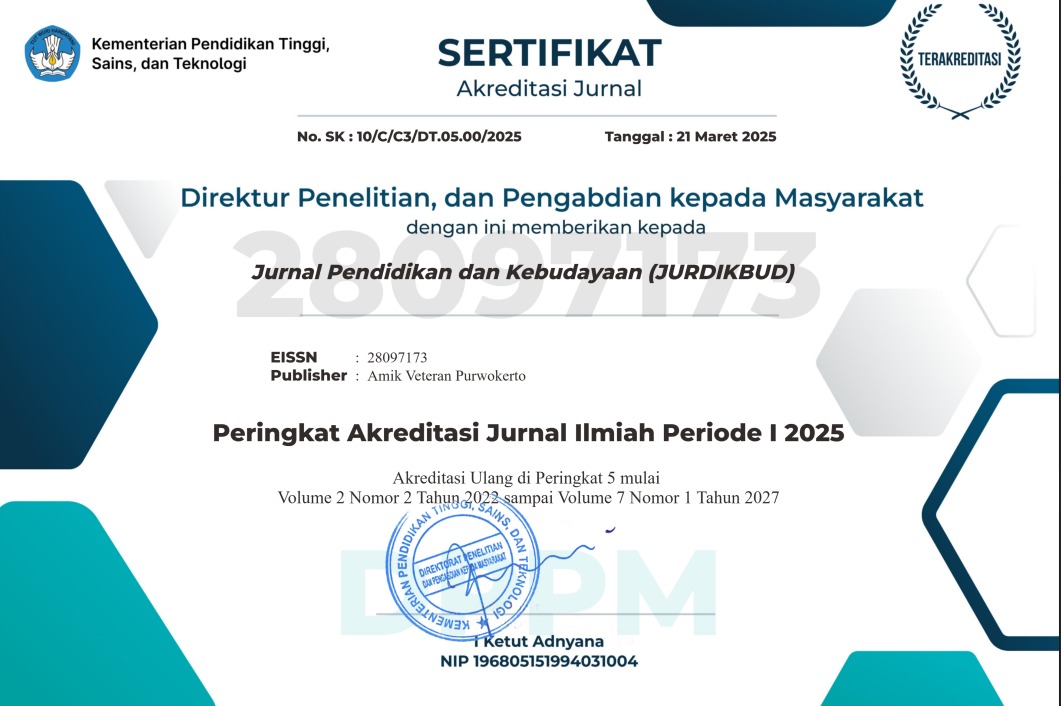The Utilization Of Memrise Application In Improving Students’ English Vocabularies at SMPN 4 Marisa
DOI:
https://doi.org/10.55606/jurdikbud.v5i2.7495Keywords:
Memrise Application, English Vocabulary, Digital Learning Media, Junior High School Students, Qualitative Approach.Abstract
This research aimed to determine the utilization of the Memrise application in improving English vocabulary among seventh-grade students at SMPN 4 Marisa. This research employed a qualitative approach involving 20 students selected through purposive sampling. Data were collected through observation and interviews students'.The results showed that the use of Memrise helped enhance the students' English vocabulary, such as its interactive features, such as visuals, repetition, and game-based activities, increased students' interest and motivation in learning. The improvements identified include five aspects: vocabulary mastery, spelling accuracy, learning motivation, pronunciation, and vocabulary retention. In addition, students gave positive responses to the use of Memrise, stating that it was enjoyable, easy to understand, and effective in helping them learn new words. Therefore, Memrise can be considered an effective digital learning medium for improving students’ English vocabulary.
References
Mayer, R. E. “Multimedia learning (3rd ed.)”. Cambridge University Press (2020).
Meylisa Anggraini, "The Correlation Between Students' Motivation and Vocabulary Mastery in English Learning at Grade VIII SMPN 15 Jambi City ", 2022.Phd Thesis, University Bhayangkari 32.
Milton, J. (2020). Measuring Second Language Vocabulary Acquisition. Bristol: Multilingual Matters, hlm. 52.
Muhammad Syahrip et al., “Improving Students Vocabulary Mastery by the Used of Mnemonic Technique,” English Language Journal 8, no. 2 (2022): 168–170
Murphy, R ‘English Grammar in Use. Cambridge University Press’.(2020).
Nation, I. S. P. Learning Vocabulary in Another Language. Cambridge University Press, 2020
Nation, I.S.P. (2020). Learning Vocabulary in Another Language. Cambridge University Press.
Rahmawati, Y., & Yulia, R. "Enhancing Students' Motivation through Language Learning Applications." Journal of Language and Educational Innovation, vol. 11, no. 2, 2021, pp. 56-67.
Smith, L. (2022). The Future of Digital Language Learning. Springer, halaman 15.
Smith, T., & Taylor, J. "User Experience in Language Learning Apps: Case Study of Memrise." International Journal of Educational Technology, vol. 12, no. 3, 2020, pp. 88-95.
Stephanie Feli Taebenu and Caroline V. Katemba, “Vocabulary Enhancement through Memrise and Google Classroom,” Language Literacy: Journal of Linguistics, Literature, and Language Teaching 5, no. 1 (2021): 228–41, https://doi.org/10.30743/ll.v5i1.3813
Tondeur, J., et al. "Technology Integration in Education: A Review of Case Studies and Insights." Educational Technology & Society, vol. 23, no. 4, 2020, pp. 45-57.
Wang,S.(2019)."Enhancing Collaborative Language Learning in Online Environments." Educational Technology Research and Development, 67(4), 1053-1075, halaman 120.
Ziegler,N.(2020). Digital language learning and teaching: Research,theory, and practice. Routledge.
Downloads
Published
How to Cite
Issue
Section
License
Copyright (c) 2025 Jurnal Pendidikan dan Kebudayaan (JURDIKBUD)

This work is licensed under a Creative Commons Attribution-ShareAlike 4.0 International License.








